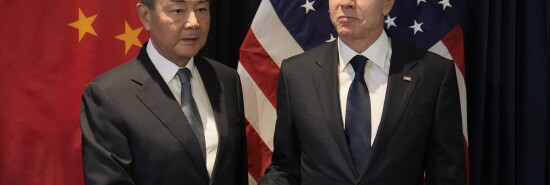
China hints Wang Yi may not visit US in protest over Taiwan aid
Tom Rogan
Following a meeting between U.S. and Chinese officials in Washington on Monday, the U.S. invited Chinese Foreign Minister Wang Yi to visit Washington. State Department spokesman Matthew Miller observed that “We certainly expect that [the visit] is something that they would accept and is a trip that we expect to happen, but we have not yet scheduled a date.”
Miller’s comment was ill-advised. Beijing is deeply paranoid about avoiding the perception that it is being pressured by Washington to march to a U.S. agenda. And that’s how Beijing sees Miller’s words.
The difference between how Beijing and Washington view their recent renewal of diplomatic interchanges is significant. It becomes plain when one contrasts each nation’s respective readout of the Washington meeting, for example. In its concluding line, the Chinese readout emphasizes that its official “expounded on China’s solemn position on the Taiwan question.” In contrast, the Taiwan element of the State Department’s readout said only that the two sides discussed “cross-Strait issues.” It concluded with the optimistic observation, “The meeting followed Secretary Blinken’s travel to Beijing and meeting in Jakarta with Director Wang Yi, among other recent bilateral engagements.”
CHINA SHOULD THANK TAMMY BALDWIN FOR HER NAVY SHIPBUILDING AMENDMENT
Top line: Beijing is far less happy about the state of diplomacy.
On Wednesday, China’s Global Times propaganda newspaper explained why Xi Jinping’s regime is skeptical about the prospect of Wang visiting the U.S. It twice declared that the Chinese Foreign Ministry had not mentioned anything about the U.S. invitation. On the contrary, the newspaper suggested that “the U.S. is trying to push China to compromise on its bottom-line and weaken China’s determination to take counter-move by releasing signals for communications but showing no concrete sincerity to stop its hostile moves against China.” The Central Foreign Affairs Commission’s (which Wang also heads) mouthpiece concluded, “the U.S. side is creating too many uncertainties that could ruin its plan to engage with China.”
What China is most upset about is President Joe Biden’s authorization of $345 million in aid to Taiwan last Friday. For the first time, this included aid provided to Taiwan from Biden’s executive “drawdown” authority. Beijing will view this as a deliberate U.S. effort to link its support to Taiwan to its support to Ukraine (where Biden has also used drawdown authority). That matters because China despises any linkage of Taiwan to Ukraine, rightly fearing that any moral connection between the two nations’ plight will increase international pressure on it to avoid attacking Taiwan.
CLICK HERE TO READ MORE FROM THE WASHINGTON EXAMINER
This is no small concern. Taiwan is what the Chinese Foreign Ministry describes as “the very core of China’s core interests and the first red line” in Sino-American relations. Indeed, as China’s Xinhua state media agency expounded on Wednesday, “the supply of weapons by the United States to the Taiwan region of China seriously violates the one-China principle … seriously damages China’s sovereignty and security interests, and seriously undermines Sino-U.S. relations and peace across the Taiwan Strait.”
As I noted in May, the great distinction between what the U.S. and China expect from their diplomatic detente was always ultimately inevitable. The truth is that these two nations simply have too much political ground of too much sensitivity now separating them. And neither side has the interest or capacity to yield to the other side’s agenda.
